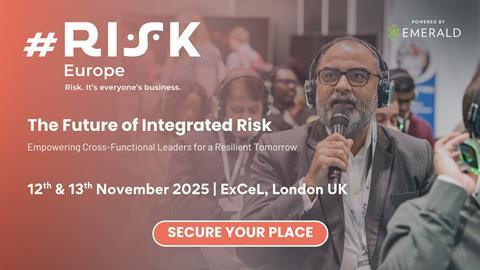As boardrooms chase the immense power of AI and data, the responsibility to manage the fallout lands squarely on risk leaders.
There’s a tension in every boardroom in 2025. On one side of the table, you have the palpable excitement for the power of modern innovation—the drive to deploy generative AI, to harness predictive analytics, and to build hyper-connected global operations. It’s a race for competitive advantage, and no one wants to be left behind.
On the other side, you have the guardians of trust, the risk and compliance leaders tasked with a formidable responsibility: managing the fallout. They see not just opportunity, but a new frontier of complex, interconnected risks. The very tools that promise to reshape markets also create unprecedented vulnerabilities.
This is the central challenge. It’s a tightrope walk between progress and prudence, and it’s the guiding principle behind the ambitious agenda for #RISK Europe, taking place at ExCeL London on November 12-13. The event is positioning itself not just as a conference, but as an answer to this dilemma, structuring its content as a two-day journey from understanding the power to mastering the responsibility.
Day 1: Getting the Lay of the Land
The modern risk landscape is a tangled web. A cyber threat is now a third-party issue, a data privacy breach is a regulatory crisis, and an AI deployment is an ethical minefield. The first day of #RISK Europe is designed to unpick this complexity by focusing on the foundational pillars driving both change and instability.
Across four main content theatres—GRC Collaborate, Risk, GRC Innovation, and Cyber GRC—the agenda will provide a comprehensive, cross-sector view of the macro-forces at play. Before you can govern AI, you need to understand its capabilities and limitations. Before you can manage supply chain fragility, you must grasp the geopolitical and economic currents causing the disruption. Day 1 is about establishing that baseline, providing every attendee with a common language and a clear view of the threats and trends that define the modern enterprise. It’s the essential grounding needed before diving into the specifics.
Day 2: Where Theory Meets Reality in Regulated Industries
On the second day, the conference sharpens its focus, taking the foundational knowledge from Day 1 and stress-testing it against the harsh realities of regulated industries. We’ll explore the unique pressures, regulatory demands, and ethical considerations faced by those on the front lines.
The core domains will be filtered through the lens of key sectors, including:
- Financial Services
- Healthcare
- Pharmaceuticals
- Energy
- Education
Why this approach? Because the responsibility of managing risk is not one-size-fits-all. For a banker, an AI underwriting model that exhibits bias isn’t just a technical glitch; it’s a potential breach of the FCA’s Consumer Duty, carrying regulatory fines and reputational damage. For a doctor relying on an AI diagnostic tool, the stakes are human lives. Managing third-party cyber risk under DORA in the financial sector is a fundamentally different challenge from protecting priceless intellectual property during pharmaceutical R&D or safeguarding vulnerable student data in education.
Day 2 sessions will tackle these specific, real-world challenges head-on. The format promises candid conversations with industry-specific experts on how they are navigating their unique landscapes. But while the focus is specific, the lessons will be universal. The deep-dives are designed to be blended with cross-sector themes, acknowledging that challenges like managing human risk, communicating effectively with the board, and fostering a healthy “speak-up” culture are shared by everyone, regardless of their industry.
A New Mandate for Leadership
The risk leader of the future cannot be a specialist in a single domain. They must be an integrator, capable of understanding how a technological choice in one department creates a compliance risk in another.
The event is built for this new era of leadership, one where managing risk collaboratively isn’t just a matter of good governance—it’s a fundamental requirement for survival and success. The call from London this November is not just to attend another conference, but to join a critical conversation about mastering the tools of modern power and embracing the responsibility to wield them wisely.











8 Readers' comments